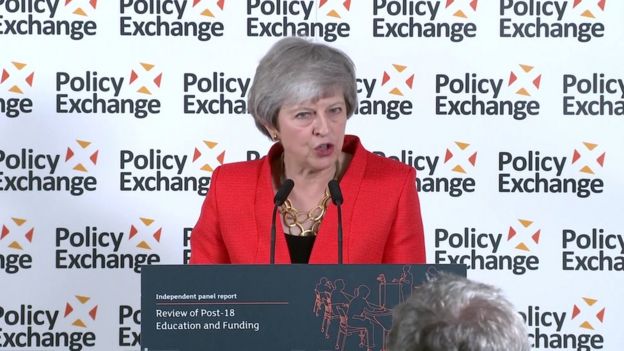
Pic--Theresa May has announced plans for tuition fees - and could still make announcements on school funding
Political&Health reporter(wp/bbc):::
Theresa May, using some of her remaining political authority before leaving office, has called for improvements in preventing mental health problems.
The prime minister wants new teachers to be trained how to spot children with mental health difficulties.
"Too many of us have seen first-hand the devastating consequences of mental illness," says Mrs May.
Labour's Barbara Keeley said the prime minister only offered "warm words".
The shadow minister for mental health said the "reality" was support services being "stretched to breaking point".
'Personal priority'
Mrs May, having stepped away from debates about Brexit, is using her last days in office to focus on what she sees as key domestic issues.
"We should never accept a rise in mental health problems as inevitable," says Mrs May, calling for early intervention.
"Tackling this burning injustice has always been a personal priority for me," said the prime minister, saying that preventing mental illness should get the "urgent attention it deserves".
- Students want parents to be told by university about mental health problems
- University told to learn lessons after student's suicide
- More students seek help with mental health problems
- Universities struggle with rising numbers of stressed students
She wants teacher training to include lessons in identifying children who might have mental health problems and to address issues such as self-harm.
At university level, there will be £1m for a competition to come up with innovative ideas to tackle mental health problems among students.
NHS staff will be encouraged to take suicide prevention training.
The prime minister also promised the publication of a White Paper setting out the government's response to Sir Simon Wessely's review of the Mental Health Act.
Wait for treatment
Sir Simon will be among those attending a roundtable discussion of his review on Monday, along with Health Secretary Matt Hancock and Simon Stevens, chief executive of NHS England.
The prime minister's efforts were praised by Paul Farmer, chief executive of Mind, the mental health charity."It's particularly positive to see such priority given to young people's mental health - our recent work in schools has shown us the true scale of the need," said Mr Farmer.
But Labour's shadow minister for mental health, Barbara Keeley, accused the prime minister of ignoring the "reality" of over-stretched budgets and delays in treatment.
"We know thousands of children and young people are either turned away from mental health services or have to wait too long for treatment," she said.
School funding
Mrs May, although having stepped down as Conservative party leader, remains as prime minister - and is said to still want to push ahead with ideas and policies that had been held back by Brexit.
Last month she launched the findings of a review into university and further education college funding.
She backed the report's call for a cut in fees to £7,500 in England and an increase in support for further education colleges.
There are believed to be plans for further announcements on education, with suggestions that funding plans to address school and college budget shortages could be brought forward.
Implementation will depend on her successor and the agreement of the Treasury, but Mrs May could still set out her plans for spending more on schools and colleges.
A Number 10 source said suggestions over the prime minister's education spending plans were "speculation".

